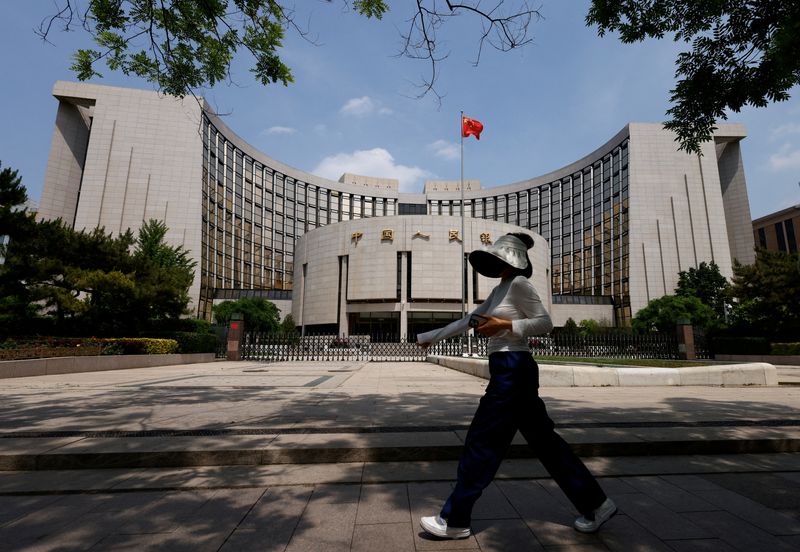
By Kevin Yao and Joe Cash
BEIJING (Reuters) -Chinese authorities announced on Wednesday a raft of stimulus measures, including interest rate cuts and a major liquidity injection, as Beijing steps up efforts to soften the economic damage caused by the trade war with the United States.
The announcements come shortly after U.S. and Chinese officials said Treasury Secretary Scott Bessent and chief trade negotiator Jamieson Greer will meet China’s top economic official He Lifeng in Switzerland this weekend for talks.
The talks are the first opportunity for the two sides to de-escalate tensions after a protracted cat-and-mouse game over tariffs in which neither wanted to be seen as backing down. The tensions have roiled global markets and upended supply chains.
The Chinese economy is already feeling the pain from the triple-digit levies, with data last week showing factory activity contracting in April at the fastest pace in 16 months. Concerns have been rising over the impact the tariffs would have on the job market and on the already-strong deflationary pressures in China as exporters lose their biggest customer.
“The domestic economy must be strong enough before (China) kicks off any protracted trade negotiations,” Xing Zhaopeng, senior China strategist at ANZ, said of Wednesday’s stimulus measures.
Chinese stocks rose as investors cheered the easing steps and the ice-breaker trade talks.
Citi analysts said in a note that “the tariff impact had started to surface,” and the stimulus measures could be “tactical” ahead of the trade talks.
“Timely domestic support could create more leverage for China,” they said.
China’s central bank will lower the borrowing cost of its seven-day reverse repurchase agreements, its benchmark interest rate, by 10 basis points (bps) to 1.40%, effective May 8. Other interest rates will drop in line with the key rate.
The amount of cash that banks must hold as reserves, known as the reserve requirement ratio (RRR), will also be cut by 50 bps from May 15, bringing the average level to 6.2%.
The People’s Bank of China’s (PBOC) Governor Pan Gongsheng told a press conference the first RRR cut since September last year will release 1 trillion yuan ($138 billion) in liquidity.
At the same event, the chairman of the China Securities Regulatory Commission, Wu Qing, said authorities will help A-share listed companies affected by tariffs to cope with difficulties.
Li Yunze, the head of the National Financial Regulatory Administration, said Beijing will expand a pilot scheme allowing insurance companies to invest in stock markets by an additional 60 billion yuan ($8.31 billion).
